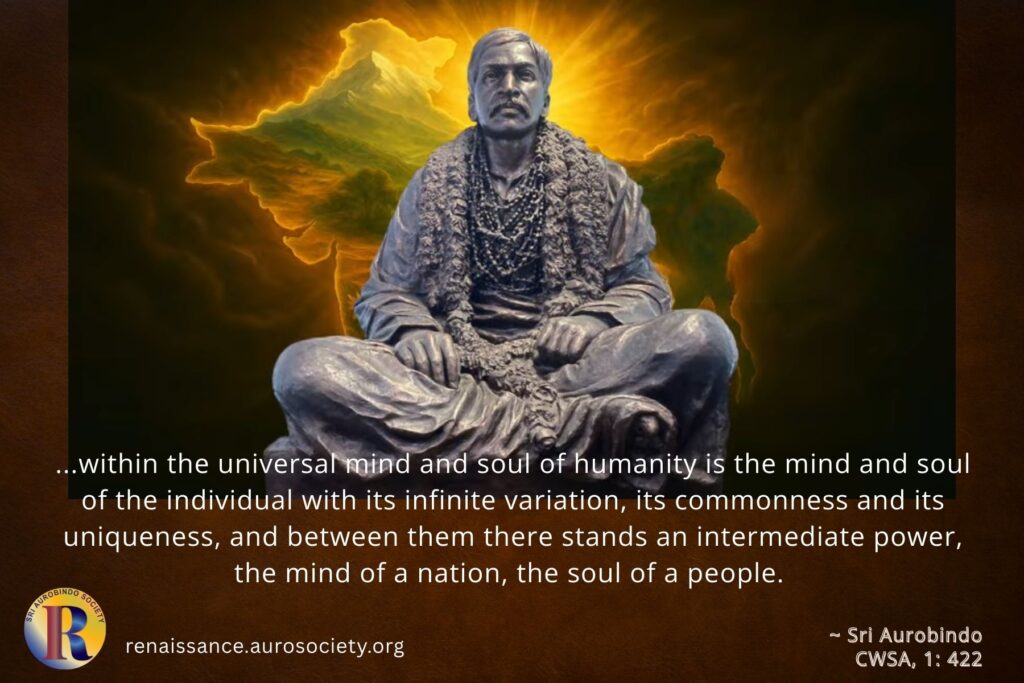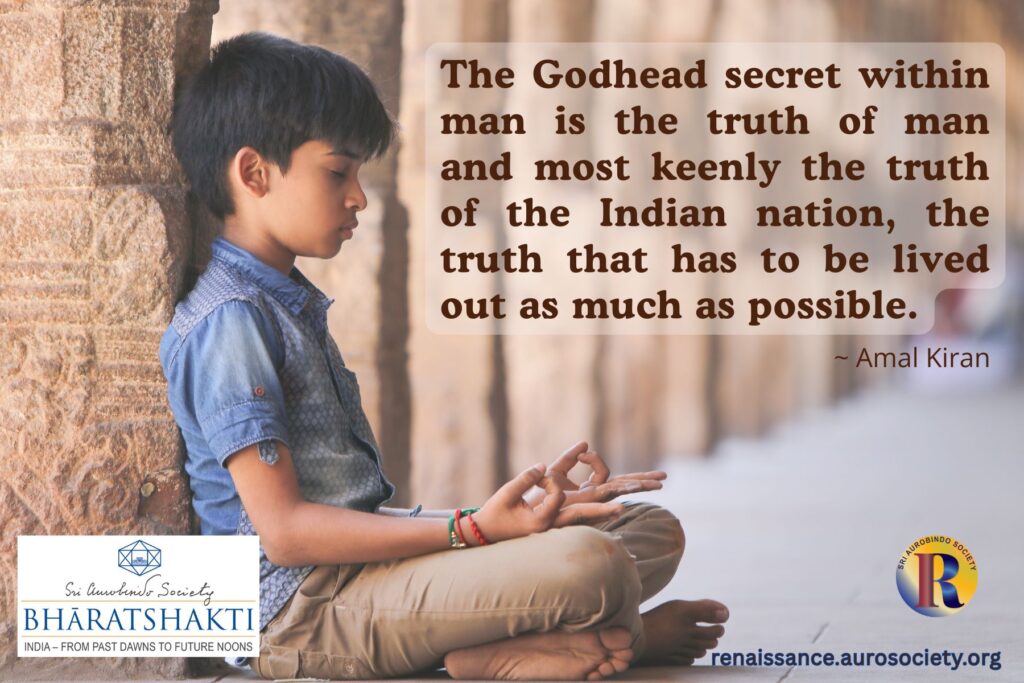Volume 1, Issue 5
Author: Agali Venkappa Sastri
Continued from Part 5
MODERN INDIAN NATIONALISM
From the foregoing survey it emerges that India has had a distinct view of her own political development all along, although baulked by circumstances. Thus, in our modern political existence as a nation-state since independence from the British colonial rule, we need not necessarily follow the lines of political development as traced by the British.
Contrary Currents
The British period of India’s political history, it is clear, represents a breach with the past. Today’s India certainly need not revert to her ancient past, – no such returns are possible in history, – but it will be in India’s (and the world’s) interest if India joins the main route of her own unique line of development from which she was temporarily deflected.
It was assumed by English writers on India that she was totally devoid of political tradition and political capacity except for certain primitive beginnings in early Aryan institutions, and that there was no alternative to her acceptance of British models, British guidance and British lines of growth.
Lord Irwin said:
Much of the current controversy in both India and this country [England] assumes that recent political developments in India represent a violent break with India’s past, an unnatural turning away from what is Indian, and from what is therefore more appropriate to Indian conditions and circumstances.
If this were true, it would be a matter for anxious heart-searching on the part of all concerned, because then there would be an alternative to the purely British institutions and form of government which have been during recent years in process of establishment in India. Moreover, the alternative would be something home-grown and acclimatized to the soil.
But, since it is not true, the sooner the unreal alternative is dismissed, the more speedily and effectively will the way be open to the recognition of the real forces now governing the political life of India, and the easier will it be able to guide these into constructive channels where they may produce their legitimate effect.
(Political India, pp. 6-7)
From this it is but one step to argue that in Lord Irwin’s estimation we were not different but backward and that we needed political instruction or indoctrination of approved British experience.
As if to meet the bureaucracy half way, public men at the beginning of the nineteenth century and even after, took it upon themselves to prove that India was apt for representative institutions judged by the criteria of the West. They tacitly admitted the absence of democratic conceptions in India, accepted British dogmas as the last word of political wisdom. They did not understand the past achievements of the race or had scant opinion of their worth and lacked independent political thinking.
Nineteenth Century Nationalism in India
The first phase of British rule in India was inevitably a period of surprise, of the easy glamour for novel political ideals and methods, of the easy acceptance and mechanical adaptation of the dogmas of the ruling power. The effects of political domination were obvious.
The British brought with them certain axioms of social and political philosophy which were genuine enough so far as they were concerned. They were the crystallised outcome of British history, of European tradition. As rulers they could and did presume the superior merit of their culture and sought to impose it on the subject population.
Macaulay’s philistinism and dogmatic assumption of the superiority of a single shelf of European books to all the literature of the East is a typical illustration of the inability of the Western mind to appreciate the characteristic worth of a different culture. It is an opposition of standpoints, temperamental divergencies between the two halves of the globe fully analysed by Sri Aurobindo in the first part of his rejoinder to William Archer’s attack on India.
Political authority, missionary propaganda and educational innovations combined to operate a powerful illusion in regard to the virtue of British institutions, ideals and methods and to inspire in the first generation of Indian intellectuals a pathetic blindness and contempt for their own past.
The advent of the British in India synchronised with a low ebb of national vitality. It was the reign of passivity, a moment of tamas, of the exhaustion of a long endeavour – one that periodically comes upon all nations. The acceptance by the Indian intellectual and political elite of the rationalistic, individualistic modes of thinking was not prompted by a real need, by the insufficiency of their traditional philosophy, by the proved inadequacy or unsoundness of their prime beliefs.
It was an inert acceptance, a lazy tribute to the ruling power. It meant an acquiescence to the British regime and a docile, servile apprenticeship to their methods of reforms and agitation.
Nineteenth century politics in India was utterly derivative, imitative, self-forgetful. It was a barren phase of political constitutionalism, significant and effective in England where the constitution was of the people’s making, a reflex of their national need and temperament, but in India a mere simulacrum.
Sri Aurobindo summarised this imitative political and nationalistic resurgence in the 19th century India, still a subject-nation living under the oppressive foreign rule, as follows:
The redress of particular grievances and the reformation of particular objectionable features in a system of Government are sufficient objects for organized resistance only when the Government is indigenous and all classes have a recognised place in the political scheme of the State.
They are not and cannot be a sufficient object in countries like Russia and India where the laws are made and administered by a handful of men, and a vast population, educated and uneducated alike, have no political right or duty except the duty of obedience and the right to assist in confirming their own servitude.
They are still less a sufficient object when the despotic oligarchy is alien by race and has not even a permanent home in the country, for in that case the Government cannot be relied upon to look after the general interests of the country, as in nations ruled by indigenous despotism; on the contrary, they are bound to place the interests of their own country and their own race first and foremost.
Organized resistance in subject-nations which mean to live and not to die, can have no less an object than an entire and radical change of the system of Government; only by becoming responsible to the people and drawn from the people can the Government be turned into a protector instead of an oppressor.
But if the subject-nation desires not a provincial existence and a maimed development, but the full, vigorous and noble realization of its national existence, even a change in the system of Government will not be enough; it must aim not only at a national Government responsible to the people but at a free national Government unhampered even in the least degree by foreign control.
It is not surprising that our politicians of the nineteenth century could not realize these elementary truths of modern politics. They had no national experience behind them of politics under modern conditions; they had no teachers except English books and English liberal ‘sympathisers’ and ‘friends of India’.
Schooled by British patrons, trained to the fixed idea of English superiority and Indian inferiority, their imaginations could not embrace the idea of national liberty, and perhaps they did not even desire it at heart, preferring the comfortable ease, which at that time still seemed possible in a servitude under British protection, to the struggles and sacrifices of a hard and difficult independence.
Taught to take their political lessons solely from the example of England and ignoring or not valuing the historical experience of the rest of the world, they could not even conceive of a truly popular and democratic government in India except as the slow result of the development of centuries, progress broadening down from precedent to precedent.
They could not then understand that the experience of an independent nation is not valid to guide a subject-nation, unless and until the subject-nation throws off the yoke and itself becomes independent. They could not realise that the slow, painful and ultra-cautious development, necessary in mediaeval and semi-mediaeval conditions when no experience of a stable popular Government had been gained, need not be repeated in the days of the steamship, railway and telegraph, when stable democratic systems are part of the world’s secured and permanent heritage.
The instructive spectacle of Asiatic nations demanding and receiving constitutional and parliamentary Government as the price of a few years’ struggle and civil turmoil, had not then been offered to the world.
But even if the idea of such happenings had occurred to the more sanguine spirits, they could have been prevented from putting it into words by their inability to discover any means towards its fulfilment.
Their whole political outlook was bounded by the lessons of English history, and in English history they found only two methods of politics, – the slow method of agitation and the swift decisive method of open struggle and revolt; unaccustomed to independent political thinking, they did not notice the significant fact that the method of agitation only became effective in England when the people had already gained powerful voice in the Government.
In order to secure that voice, they had been compelled to resort no less than three several times to the method of open struggle and revolt.
Blind to the significance of this fact, our nineteenth century politicians clung to the method of agitation, obstinately hoping against all experience and reason that it would somehow serve their purpose. From any idea of open struggle with the bureaucracy they shrank with terror and a sense of paralysis.
Dominated by the idea of the overwhelming might of Britain and the abject weakness of India, their want of courage and faith in the nation, their rooted distrust of the national character, disbelief in Indian patriotism and blindness to the possibility of true political strength and virtue in the people, precluded them from discovering the rough and narrow way to salvation.
CWSA, Vol. 6, pp. 272-274
Continued in Part 7…
Cover image – Bhārata Mahima, by Ritam Upadhyay



